Oh, just another week, really. The president intimidates one witness, another witness has Donald Trump dead to rights on not caring about anything Ukraine except how it could help him beat Joe Biden, and the attorney general gives a fascist speech making it clearer than ever that he’s going to spend the next year doing everything he can to turn the Justice Department into the committee to re-elect the president.
That’s a lot of fodder. In Democrat-land, though, it looks like it’s going to another week of repeating the same old arguments about Medicare for All.
Yes, there’s another debate Wednesday. I really have come to loathe them. They show all of them at their worst. The culprit of course is television: the need for conflict, and the desire of moderators to press the candidates to lock into commitments that everybody knows are irresponsible and ridiculous. And Medicare for All is Exhibit A here. Why? Because nobody’s passing a Medicare for All bill. The elevation of that issue to its current level of prominence is the biggest con job in contemporary politics. Yes, it has changed the conversation in good ways and moved the center of gravity leftward. But as for the bill itself, there aren’t 20 votes in the Senate for what Bernie Sanders and Elizabeth Warren are proposing.
In fact, here’s a little reality-check trivia question for you: How many Democratic senators have co-sponsored Sanders’ Medicare for All bill? At least half of them, you think? Surely at least 20? Nope. Try 14. And three of those are or were presidential candidates who pretty obviously just signed on for that reason (Kirsten Gillibrand, Cory Booker, and Kamala Harris, who swiftly backed off M4A after that first debate). So the real number is 11. That’s out of 47.
And in the House? Higher, to be sure: It’s 118 out of 233. Still, that’s barely more than half. And we know the leader of the House Democrats is against it, as is the leader of the Senate Democrats, so they’re not going to be bringing it to the floors. The Democrats could win the White House and the Senate and improve their House margin next November, and even with all that, M4A has as much chance of becoming law as I do of replacing Benedict Cumberbatch as the star of Doctor Strange in the Multiverse of Madness.
And yet, what have all these debates spent the first 45 minutes, sometimes the first full hour, on? Yep. I swear if I owned a revolver, I’d pull an Elvis and shoot the TV. As it is I sit there screaming at the television, “Will one of you candidates please have the stones to change the subject?” I’m dying to see the candidate who says: “With all due respect, we’ve spent enough time on this. It’s very unlikely to become law. People are going to start turning the channel. I want to talk about wages.”
Wages! Now there’s a topic! After the last debate, I pulled up the transcript and searched for the word “wages.” It appeared four times, as I recall. Three of those were Elizabeth Warren talking about teachers’ and child-care workers’ wages, and the fourth was Amy Klobuchar talking about her mother’s wages as a member of her teachers’ union. The phrase “minimum wage” got three quick mentions: from Booker, Harris, and Tom Steyer.
Those are all fine, but really? Wages are pretty central to people’s lives! And it’s a far more dire situation in this country than health care. About 92 percent of Americans have health care, and the polls tell us that most people find their plans more or less satisfactory (yes, they don’t understand all the ways in which people in other advanced countries have it better, but still, the polls are the polls).
But wages? Everybody below the top 5 or so percent is getting screwed. The median wage in this country is—are you ready?—$31,099. That’s a 2016 figure, so it’s surely a little higher now; let’s call it $35,000. The median household income is around $62,000. If wages had grown in this country in the last 30 years at anything like the rate they grew for the 30 years before that, both of those figures would be far, far higher. But the last 30 years have been kind mostly to the very rich and those with advanced degrees.
But if wages even come up during these debates, it’s just the minimum wage. That’s important, don’t get me wrong, but it’s only part of the story. There’s overtime pay, the far-too-little-discussed issue of wage theft, strengthening unions, changing corporate tax law to incentivize paying higher wages—lots of ways to talk about the issue. Never. Comes. Up.
Likewise, climate change didn’t come up at the last debate. That’s just insane. I hope on this one they make up for last time, but even if they do, chances are slim that it’ll be a substantive conversation. It’ll devolve into a numbers race, with Sanders shouting $16.3 trillion (his total dollar figure) and everyone else being forced to defend spending less, as if a higher dollar figure is on its own a sign of greater seriousness, which it ain’t.
In that different universe where we all wished we live, the candidates’ health-care debate would be on public television, and they’d be questioned by people like Harold Pollack, Marcia Angell, and Paul Starr. I know that’s impossible. But in the universe we inhabit, the moderators—who are really smart people, Rachel Maddow and so on—could at least at this point move the conversation in other equally important directions.
The candidates need to do it, too, even more. It would be so refreshing to see one of them challenge the rules and the format. In fact, being able to do that seems like a quality that’s pretty relevant to the job of beating Donald Trump.






